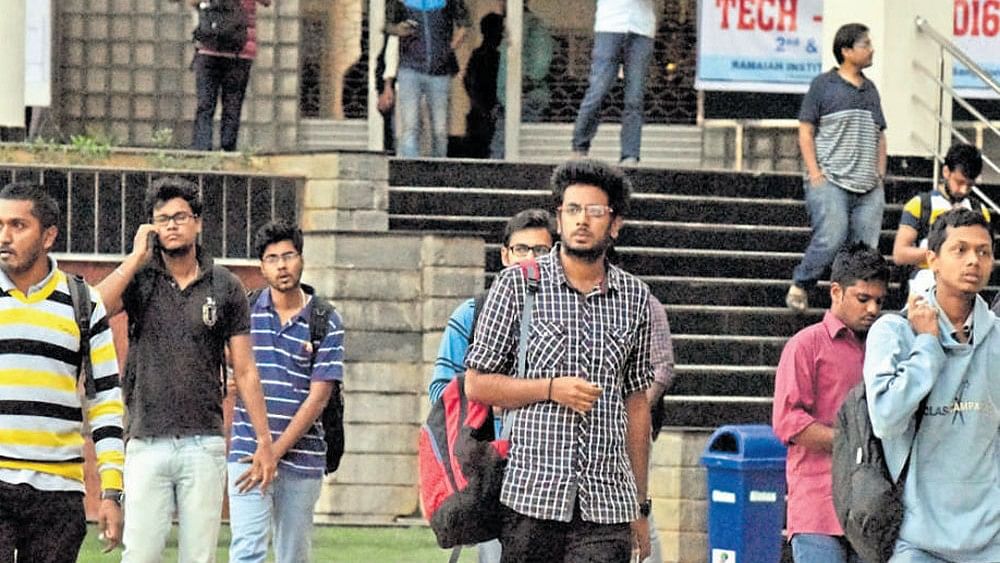
A representative image of students in a college campus.
Credit: DH File Photo
By Francesca Maglione
They didn’t walk at their 2020 high school graduations. They entered college at the height of remote learning and campus lockdowns.
And now they’re finishing exams amid nationwide protests and preparing to enter a job market that’s hard for many to navigate.
Coming up to the podium - the class of 2024.
Tainted by the pandemic, this outgoing class of seniors had anything but a typical college experience. Most are ready to enter the “real world.” Yet the class is - again - needing to adjust their expectations.
Even the best of students are facing an endless web of job applications, ambiguous timelines and countless rejections.
On the surface, the US job market is strong. Unemployment is low, and there’s been significant job growth in certain areas including health care.
However, getting on a path to a well-paid job in finance, consulting and technology — top destinations for ambitious students — is getting more difficult with greater competition for fewer entry-level positions.
US employers are hiring at the slowest pace in nearly a decade, excluding a brief dip during the early pandemic, according to the Bureau of Labor Statistics.
Fewer workers are leaving their positions after layoffs at companies such as Google Inc., Microsoft Corp., Morgan Stanley and Citigroup Inc. And confidence among entry-level workers is the lowest in Glassdoor data going back to 2016.
It all adds up to another challenging moment in the lives of the Class of 2024. Many are finding it difficult to get a foot in the door, even if their internships and work experience weren’t obviously disrupted by the pandemic.
Hundreds of applications
Ryan Lin thought he had his post-Carnegie Mellon University plan figured out. He scored a software engineering internship at Intuit Inc. in summer 2023, after applying almost a year in advance. Part of the reason he jumped on the opportunity was because he heard they had a high return-offer rate.
But after his internship ended, that offer never materialised.
Now, after applying to about 600 job postings, he decided it’s time to settle on another offer. But he said he’s disappointed. A lot of the same companies he targeted before — including Google and Amazon.com Inc. — seemed to have far fewer job postings at his level than before, Lin said.
“I was expecting that with some kind of big-tech experience, plus my past research experience at school, that at least I would get more responses than I have,” he said.
Strains in the entry-level job market have been building for at least a year. Unemployment for recent college graduates ticked up again in March — even as the rate held steady for all college graduates.
But it was only a couple years ago graduating seniors were able to leverage multiple job offers and negotiate higher compensation.
Now, career counselors — including those at Rice University in Houston, Texas — are encouraging students to “think broadly” and focus less on big company names.
Meta Platforms Inc., for instance, was a top employer for Rice seniors in 2022, but last year the tech company didn’t hire any graduates, according to the school’s career center.
Tech pulls back
The rapidly evolving landscape for artificial intelligence should be creating demand for new hires with expertise in machine learning and data science. But it could also be that the technology itself is removing the need for entry-level workers.
David Halek, a director in Yale University’s career center, said the discontent has been palpable among computer science majors.
Halek said seniors have expressed frustration about sending out hundreds of applications and not hearing anything back.
Some even believe this could be due to a phenomenon called “ghost postings”, where companies post openings to make it look like they are hiring when they’re not. He’s advised students to be open to alternative opportunities and remain flexible.
That’s a mantra Amisha Gupta, who’s graduating from the University of Washington’s human-centered design and engineering program, has taken to heart her whole college experience.
Her freshman year she stayed in India with her family and remembers taking classes at midnight and exams at 2 a.m. The campus was a “ghost town” when she did move to Seattle in January 2021.
And when she didn’t get a return offer from Apple Inc. after an internship related to project management, she said she spent months scouring career pages at the companies she was interested in.
She has secured an offer from a big tech company but has yet to accept it. The most frustrating part of the whole process, for her, was the uncertainty of the timelines and lack of opportunities she saw online.
“I thought the market was bad last year when I was interning,” Gupta said. “I thought the market was bad for 2023 new grads.
And then in December I was like, ‘this is worse than that’. I thought nothing would be worse than that.”